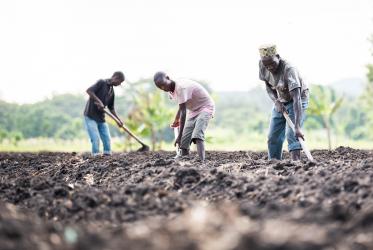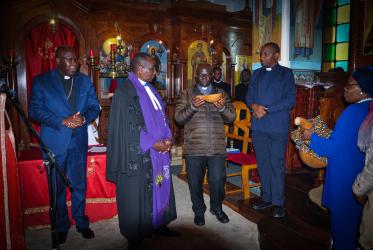Countries in the Horn of Africa afflicted by droughts and war are facing famine which visits the region regularly leaving the United Nations and faith-based organizations battling to contain the current crisis.
Faith leaders and partners from organizations linked to them are gathering this week in Nairobi, mobilizing to overcome hunger and sustain justice and peace in the troubled Horn of Africa.
The consultation organized by the World Council of Churches (WCC), the All Africa Conference of Churches and ACT Alliance, World Vision International and the World Food Programme, will be held in the Kenyan capital at the All Africa Conference of Churches (AACC) from 27-29 June.
Leaders from the World Council of Churches (WCC), ACT Alliance, Lutheran World Federation, Caritas Internationalis World Vision International and the World Food Programme (WFP) will participate.
Among speakers are: Rev. Dr Andre Karamaga, AACC general secretary; Dr Agnes Abuom, moderator of the WCC’s central committee; Ms Joyce Luma, country director for South Sudan of the World Food Programme; Mr. Arnold Ambundo, Regional program officer, ACT Alliance; Dr Manoj Kurian of the World Council of Churches Ecumenical Advocacy Alliance (EAA) and Dr Nigussu Legesse, WCC’s programme executive for Africa.
Key leaders such as Bishop Dr. Fredrick Shoo – Evangelical Lutheran Church In Tanzania, Amb. Mussie Hailu Gebretsadik - AACC representative, to the African Union, Mr Will Postma, Executive Director , The Primate’s World Relief and Development Fund, Canada, and other persons responsible for church related responses in the Horn of Africa are facilitating this meeting.
The UN has declared famine in parts of South Sudan, but in adjoining areas such as Somalia, Ethiopia, Burundi, Kenya, and Uganda the situation is fragile.
Organizers say they aim to build on the momentum gained on the Global Day of Prayer to End Famine on 21 May by engaging in strategic discussions.
The WFP has classified the drought crisis in the Horn of Africa as a “Level 2 Emergency”.
In Somalia some 2.9 million people and in neighbouring Ethiopia around 5.6 million people are categorized as being in either crisis or emergency and require urgent humanitarian assistance.
Further south in Kenya, 2.6 million people also require emergency food assistance.
In South Sudan, Food security situation continues to deteriorate further. 6.0 million (50% of the population) expected to be severely food insecure in June-July 2017. Food insecurity is following politically driven armed conflicts and is affecting crop and livestock production the failure of markets and the delivery of humanitarian assistance
The UN and church leaders are worried about the nexus between conflicts and hunger knowing that food insecurity and starvation are increasingly being used in conflicts as weapons of war.
The weaponizing of food adds to the humiliation and the decimation of populations and the shredding of the very fabric of human societies, they say.
Media contacts:
Please contact WCC director of communication Marianne Ejdersten: [email protected], +41 79 507 63 63
Millions join hearts and minds to pray for end to famine, WCC press release 22 May, 2017







